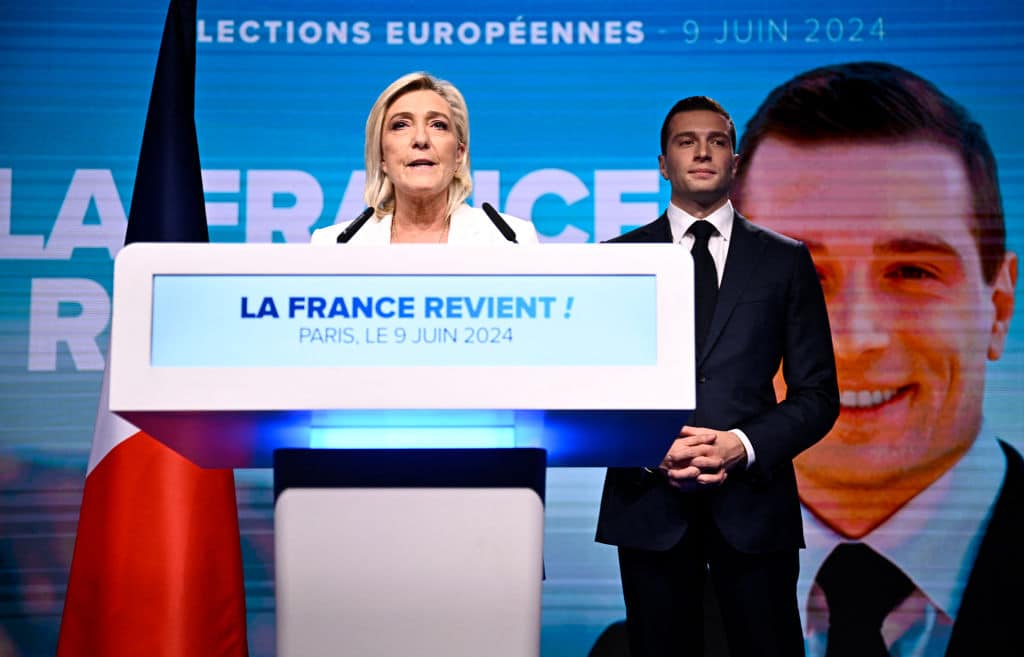The French are not known for being fans of American ways. But their voting patterns, especially among Catholics, are becoming more similar when it comes to embracing candidates that some consider beyond the pale.
It was once said of US Catholics that they could be relied on to vote Democratic. But that is no longer true. In recent presidential elections their vote has been pretty evenly split. In the 2012 election, for example, Barack Obama got 50 per cent of the Catholic vote and the Republicans’ Mitt Romney got 48 per cent.
Four years later, 50 per cent of Catholics cast their ballot for Donald Trump and 46 per cent for Hillary Clinton. According to a recent survey in the States, this year <a href="https://catholicherald.co.uk/biden-in-worse-trouble-than-trump-with-catholic-voters-especially-if-they-go-to-mass/?swcfpc=1"><mark style="background-color:rgba(0, 0, 0, 0)" class="has-inline-color has-vivid-cyan-blue-color">Trump will be able to count on 55 per cent of Catholics</mark></a> (rising to 61 per cent among white Catholics) while only 43 per cent declared for Joe Biden.
That is an astonishing statistic given that Biden is only the second Catholic president – after John Kennedy – of the USA.<br><br>To a large extent the reason behind that, according to the political scientist Steven P. Millies, is because Trump’s brand of Republicanism “is no longer a political party, it's a brand of cultural dissatisfaction”.<br><br>The same phenomenon is evident in France where cultural dissatisfaction has led to a surge of support among French Catholics for Marine Le Pen’s National Rally Party. <br><br>In the 2019 European elections, Le Pen’s right-wing party received 18 per cent of the Catholic vote; in the recent 2024 elections that share had increased to 32 per cent. A further ten percent of Catholics voted for Eric Zemmour’s Reconquest Party. Zemmour, a Jew, is more economically liberal than Le Pen and more socially conservative.
Catholics are not the only tranche of French society who have been lured to Le Pen in recent years as she set about “normalising” her party after replacing her father as president in 2011.
Jean-Marie Le Pen was a swaggering bigot, convicted multiple times of anti-Semitism and minimising the Holocaust. Although he grew the party he founded in 1972, initially called the National Front, to the point where thirty years later he reached the second round of the presidential election, Le Pen remained too toxic to ever win enough votes to become mainstream.
His daughter has changed that by ridding the party of its reputation for anti-Semitism and making it more “respectable” for the middle classes.
This was evident in her party’s <a href="https://catholicherald.co.uk/european-elections-results-could-both-hinder-and-help-popes-agenda/"><mark style="background-color:rgba(0, 0, 0, 0)" class="has-inline-color has-vivid-cyan-blue-color">landslide victory in the European Elections</mark></a>, where the National Rally’s Jordan Bardella won 31 per cent of the vote, more than twice that of Emmanuel Macron's candidate, the centrist Valerie Hayer, who finished second with 14 per cent.
That stinging defeat prompted Macron to call a snap election on June 30 with the second round a week later. The polls have Le Pen’s party on course to win most seats in the 577-seat National Assembly.
What was once a party for the angry white middle-aged working classes has become, like the Americans’ Republicans, “a brand of cultural dissatisfaction”.
Le Pen pulls in a broad cross section of society: the young, the retired, white-collar professionals, women, Jews and Catholics.
According to one of France’s leading social scientists, Jérôme Fourquet, Le Pen is profiting from the “cultural insecurity” that has been growing among millions of French men and women in the last decade.
In an<mark style="background-color:rgba(0, 0, 0, 0)" class="has-inline-color has-vivid-cyan-blue-color"> <a href="https://www.la-croix.com/a-vif/jerome-fourquet-les-catholiques-pris-en-tenaille-entre-le-wokisme-et-un-islam-identitaire-20240617">interview with <em>La Croix </em>newspaper</a></mark> last week, Fourquet attributed this insecurity to two distinct factors: the surge in immigration in recent decades (under Macron, legal and illegal immigration has reached record levels), particularly from Tunisia, Morocco and Algeria. This had led some French to feel “they are no longer truly at home”.
The <a href="http://breaking"><mark style="background-color:rgba(0, 0, 0, 0)" class="has-inline-color has-vivid-cyan-blue-color">second factor resonates particularly with Catholics, and that is the social liberalism</mark></a> that began with Francois Hollande’s Socialist government in 2012 and has been continued under Macron, who, while more to the right than Hollande economically, is more of a social progressive.
Fourquet cited the expansion of medically assisted procreation to lesbian couples and single women, the legalisation of gay marriage and <a href="https://catholicherald.co.uk/euthanasia-in-france-president-macrons-strategy-on-assisted-dying-may-well-backfire/"><mark style="background-color:rgba(0, 0, 0, 0)" class="has-inline-color has-vivid-cyan-blue-color">the assisted dying bill</mark></a>, which Macron announced earlier this year.
“Practising Catholics may also feel a form of anthropological insecurity in the face of the societal changes," explained Fourquet, "caught between Woke’ progressivism on the one hand and, on the other, demographic change and the assertion of an identity-based Islam in the public arena."
Catholicism has been singled out by Islamic extremism in two notorious atrocities in recent years: the murder of Father Jacques Hamel as he said Mass in his Normandy church in 2016, and the killing of three worshippers at their church in Nice in 2020.
The growth in support among Catholics for the National Rally has <a href="https://www.spectator.co.uk/article/can-a-ragtag-coalition-of-communists-and-radical-greens-stop-marine-le-pen/"><mark style="background-color:rgba(0, 0, 0, 0)" class="has-inline-color has-vivid-cyan-blue-color">alarmed some within the Church</mark></a>, and last week a Collective of Young Christians – signed by 6,000 Protestants and Catholics, including 70 priests – published an open letter urging people not to vote for Le Pen’s party in this week’s election.
Many Catholics will pay no heed to the declaration. For them the real danger facing France is not Marine Le Pen but a left-wing coalition that includes radicals, Communists, Hamas sympathisers and admirers of Maximilien Robespierre.
And French Catholics need no reminding of what that tyrant did to their religion.<br><br><em>Photo: National Rally Party leader Marine Le Pen, with party President Jordan Bardella standing beside, speaks a rally at the Pavillon Chesnaie du Royon on the final day of the European Parliament elections, Paris, France, 9 June 2024. (Photo by JULIEN DE ROSA/AFP via Getty Images.)</em>



